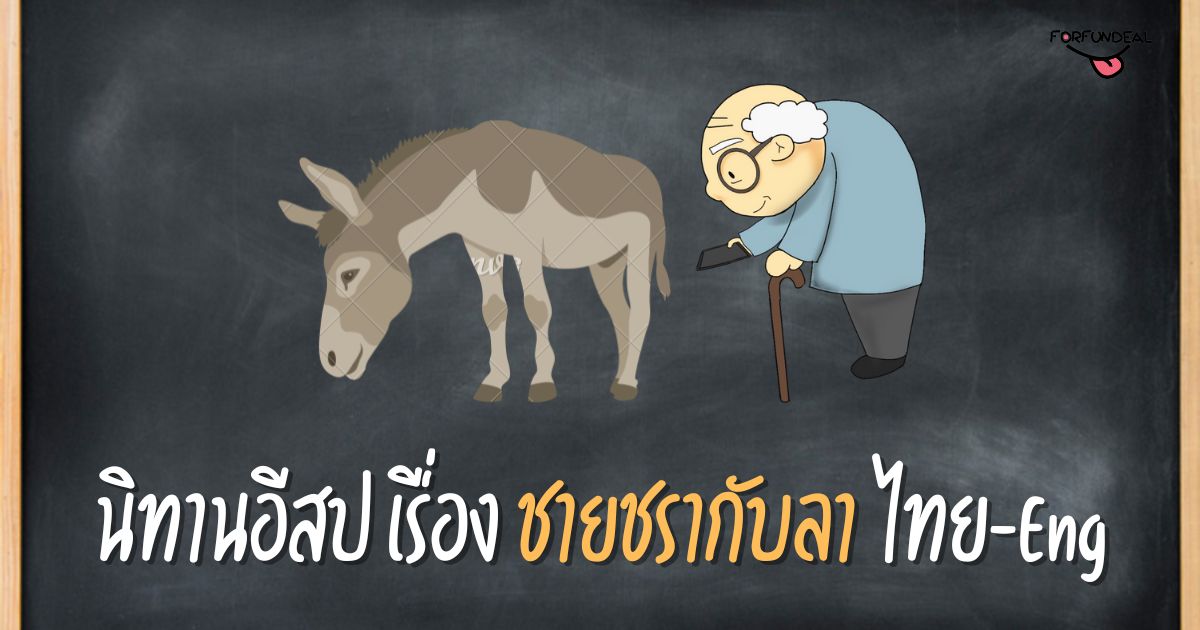“ชายชรากับลา” เป็นนิทานอีสปที่นำเสนอเรื่องราวแสดงให้เห็นว่าการเปลี่ยนแปลงรัฐบาล หรือการปกครองมักไม่นำไปสู่การปรับปรุงอย่างแท้จริงสำหรับคนทั่วไป
นิทานอีสปเรื่องชายชรากับลา
กาลครั้งหนึ่งนานมาแล้ว ในอาณาจักรอันห่างไกล มีชายชราคนหนึ่งซึ่งมีลาที่ซื่อสัตย์และขยันหมั่นเพียรอาศัยอยู่ ดินแดนนี้ถูกปกครองโดยกษัตริย์ แต่เวลาที่ยากลำบากสำหรับคนทั่วไป ภาษีสูงและชีวิตต้องดิ้นรน
Once upon a time, In a kingdom far away, there lived an old man who owned a loyal and hardworking donkey. The land was ruled by a king, but times were tough for the common people. Taxes were high, and life was a struggle.
วันหนึ่ง มีข่าวแพร่สะพัดว่ากษัตริย์องค์ใหม่จะได้รับการสวมมงกุฎ สัญญาว่าจะมีการเปลี่ยนแปลงและความเจริญรุ่งเรืองสำหรับทุกคน ชายชราและลาของเขาหวังว่าจะมีชีวิตที่ดีขึ้นภายใต้ผู้ปกครองคนใหม่
One day, news spread that a new king was to be crowned, promising change and prosperity for all. The old man and his donkey hoped for a better life under the new ruler.
อย่างไรก็ตาม เมื่อวันกลายเป็นสัปดาห์และสัปดาห์เป็นเดือน ชายชราสังเกตเห็นว่าไม่มีอะไรเปลี่ยนแปลงจริงๆ ภาษียังสูงและประชาชนทั่วไปยังเผชิญกับความยากลำบาก ข้อแตกต่างเพียงอย่างเดียวคือชื่อของกษัตริย์
However, as days turned into weeks and weeks into months, the old man noticed that nothing had really changed. The taxes were still high, and the common people still faced hardships. The only difference was the name of the king.
ด้วยความรู้สึกผิดหวังและไม่แยแส ชายชราจึงไปขายลาที่ตลาด ผู้สัญจรไปมาถามว่าทำไมเขาถึงขายเพื่อนที่ซื่อสัตย์เช่นนี้ ชายชราถอนหายใจแล้วพูดว่า “เมื่อมีการเปลี่ยนแปลงการปกครอง ไม่มีอะไรเปลี่ยนแปลงสำหรับคนยากจนนอกจากชื่อเจ้านายของพวกเรา”
Feeling disappointed and disillusioned, the old man went to the marketplace to sell his donkey. A passerby asked why he was selling such a faithful companion. The old man sighed and said, “When there is a change in government, nothing changes for the poor folk except their master’s name.”

นิทานเรื่องนี้สอนให้รู้ว่า
“การเปลี่ยนแปลงผู้นำส่วนมากมักจะล้มเหลวในการปรับปรุงชีวิตของผู้ด้อยโอกาส…”
- การวิเคราะห์เชิงวิพากษ์วิจารณ์การเปลี่ยนแปลง: เรื่องราวเน้นย้ำแนวคิดที่ว่าการเปลี่ยนแปลงผู้นำหรือการปกครองไม่จำเป็นต้องส่งผลให้เกิดการพัฒนาที่สำคัญสำหรับคนทั่วไปเสมอไป ส่งเสริมการคิดอย่างมีวิจารณญาณและเตือนให้เราประเมินผลกระทบของการเปลี่ยนแปลงนอกเหนือจากรูปลักษณ์ภายนอก
- สัญญาที่ว่างเปล่ากับการกระทำจริง: เรื่องราวทำหน้าที่เป็นเรื่องราวเตือนใจเกี่ยวกับความแตกต่างระหว่างคำสัญญาที่ทำโดยผู้มีอำนาจและการปรับปรุงที่เกิดขึ้นจริงที่มอบให้กับผู้ด้อยโอกาส มันสอนให้เราพิจารณาการกระทำและผลลัพธ์มากกว่าการยอมรับคำพูดอย่างสุ่มสี่สุ่มห้า
- ความสำคัญของการเอาใจใส่: เรื่องราวเน้นย้ำถึงความสำคัญของการเอาใจใส่และการเข้าใจความต้องการและข้อกังวลของประชาชนทั่วไป เป็นการเตือนเราว่าความเป็นผู้นำที่แท้จริงควรให้ความสำคัญกับความเป็นอยู่ที่ดีของบุคคลทุกคน โดยเฉพาะกลุ่มคนชายขอบ
- การสนับสนุนเพื่อการปฏิรูปอย่างแท้จริง: เรื่องราวสนับสนุนให้เราสนับสนุนการปฏิรูปที่มีความหมายและยั่งยืนเพื่อแก้ไขปัญหาเบื้องหลังที่ผู้ด้อยโอกาสต้องเผชิญ แสดงให้เห็นว่าการเปลี่ยนแปลงด้านความสวยงามโดยไม่มีสารสำคัญนั้นไม่เพียงพอ
- การตระหนักถึงความแตกต่างทางเศรษฐกิจและสังคม: ด้วยการพรรณนาถึงสถานการณ์ที่ไม่เปลี่ยนแปลงสำหรับคนยากจนแม้จะมีการเปลี่ยนแปลงผู้นำ เรื่องราวสร้างความตระหนักรู้เกี่ยวกับความแตกต่างทางเศรษฐกิจและสังคมและความจำเป็นในการเปลี่ยนแปลงระบบที่เป็นประโยชน์ต่อทุกคน
“A change in leadership often fails to bring meaningful improvements to the lives of the less privileged.”
- Critical Analysis of Change: The story highlights the idea that change in leadership or government doesn’t necessarily result in substantial improvements for the common people. It encourages critical thinking and reminds us to evaluate the impact of change beyond surface-level appearances.
- Empty Promises vs. Real Action: The story serves as a cautionary tale about the disparity between promises made by those in power and the actual improvements delivered to the less privileged. It teaches us to scrutinize actions and results rather than blindly accepting words.
- Importance of Empathy: The tale underscores the importance of empathy and understanding the needs and concerns of ordinary citizens. It reminds us that true leadership should prioritize the well-being of all individuals, especially the marginalized.
- Advocacy for Genuine Reform: The story encourages us to advocate for meaningful and lasting reforms that address underlying issues faced by the less fortunate. It suggests that cosmetic changes without substantial substance are insufficient.
- Awareness of Socioeconomic Disparities: By portraying the unchanged situation for the poor despite shifts in leadership, the story raises awareness about socioeconomic disparities and the need for systemic change that benefits everyone.
โดยสรุปแล้วนิทานเรื่องนี้เรื่องราวสะท้อนถึงความเป็นผู้นำ ความรับผิดชอบ และบทบาทของพลเมืองในการยึดถือผู้มีอำนาจที่รับผิดชอบต่อความเป็นอยู่ที่ดีของสังคมทั้งหมด

